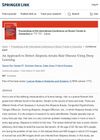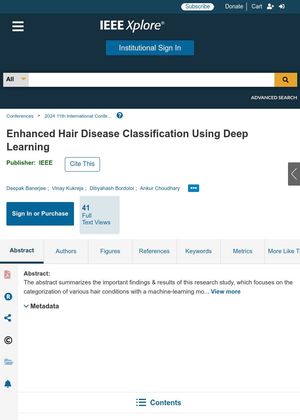TLDR The model accurately classifies hair conditions with 97% accuracy.
The study "Enhanced Hair Disease Classification Using Deep Learning" demonstrates the effectiveness of a machine-learning model in categorizing various hair conditions, such as Alopecia Areata, Tinea Capitis, and Psoriasis, using a dataset of 8,550 images. The model achieved high performance with accuracy values between 88.04% and 88.89%, recall values from 87.80% to 89.19%, and balanced F1 scores ranging from 88.02% to 88.99%. The overall accuracy was 97%, highlighting the model's reliability and efficacy in diagnosing hair diseases, which can significantly improve patient care and quality of life.
47 citations
,
July 2023 in “Nature Genetics”  January 2021 in “Lecture notes in networks and systems”
January 2021 in “Lecture notes in networks and systems” Deep learning can accurately detect Alopecia Areata with up to 98.3% accuracy.
 74 citations
,
January 2020 in “IEEE Access”
74 citations
,
January 2020 in “IEEE Access” ScalpEye accurately diagnoses scalp issues like dandruff and hair loss.
 4 citations
,
May 2024 in “INTERANTIONAL JOURNAL OF SCIENTIFIC RESEARCH IN ENGINEERING AND MANAGEMENT”
4 citations
,
May 2024 in “INTERANTIONAL JOURNAL OF SCIENTIFIC RESEARCH IN ENGINEERING AND MANAGEMENT” AI can accurately diagnose hair and scalp conditions and suggest treatments.
 1 citations
,
March 2024 in “Skin research and technology”
1 citations
,
March 2024 in “Skin research and technology” A new AI model diagnoses hair and scalp disorders with 92% accuracy, better than previous models.
 1 citations
,
January 2023 in “IEEE access”
1 citations
,
January 2023 in “IEEE access” Deep learning helps detect skin conditions and is advancing dermatology diagnosis and treatment.
 June 2023 in “International journal on recent and innovation trends in computing and communication”
June 2023 in “International journal on recent and innovation trends in computing and communication” Combining multiple algorithms predicts hair fall more accurately than using single algorithms.
 61 citations
,
June 2022 in “IEEE Journal of Biomedical and Health Informatics”
61 citations
,
June 2022 in “IEEE Journal of Biomedical and Health Informatics” The new method improves skin cancer detection in imbalanced datasets.







